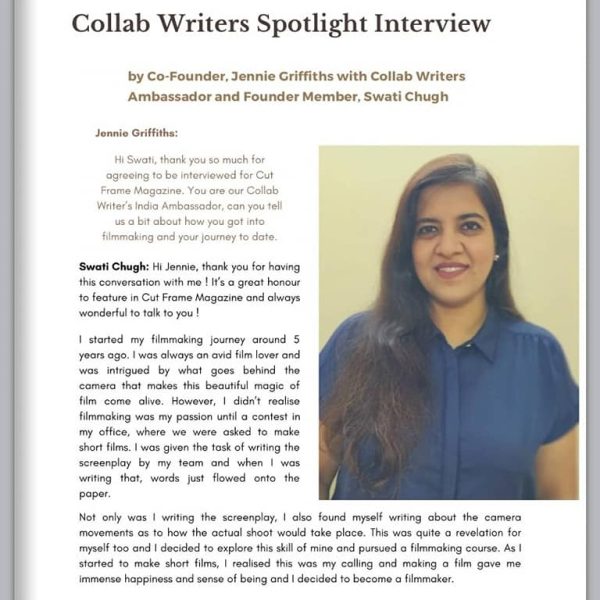
Founder – Swati Chugh’s Interview with Jennie Griffiths, Co-founder, Collab Writers, A London based creative community
JG: Hi Swati, thank you so much for agreeing to be interviewed for Cut Frame magazine. You are our Collab Writer’s India Ambassador, can you tell us a bit about how you got into filmmaking and your journey to date.
SC: Hi Jennie, thank you for having this conversation with me ! It’s a great honour to feature in Cut Frame magazine and always wonderful to talk to you ! I started my filmmaking journey around 5 years ago. I was always an avid film lover and was intrigued by what goes behind the camera that makes this beautiful magic of film come alive. However, I didn’t realise filmmaking was my passion until a contest in my office, where we were asked to make short films. I was given the task of writing the screenplay by my team and when I was writing that, words just flowed onto the paper. Not only was I writing the screenplay, I also found myself writing about the camera movements as to how the actual shoot would take place. This was a quite a revelation for myself too and I decided to explore this skill of mine and pursued a filmmaking course. As I started to make short films, I realised this was my calling and making a film gave me immense happiness and sense of being and I decided to become a filmmaker.
JG: Wow, that gave me shivers, like it’s meant to be. One of the many things that is really impressive is that you do everything yourself – you write, edit, produce, film and direct. Did you set out to do that? Or did it just happen? How do you manage to do everything and so well?
SC: Well, it actually started more as a necessity than an intentional decision. As an independent filmmaker, you don’t get a crew when you start off. So when I pursued the filmmaking course, we had a small batch of 6 people and everyone had to make a film of their own. So, we had to play all the roles and assist each other in making their films. As I went through all these processes, I realised that I enjoyed all of these roles – writing, editing and direction. So I continued doing these 3 roles for all my short films. Producing is something where I do take support from my family and my brother is a co-producer for most of my short films. The other benefit to wearing many filmmaking hats, is that it does save your budget which is something always on the mind of independent filmmakers. One important thing is to compartmentalise your mind while playing these different roles. So when I am the writer, I just write and don’t think on how would I direct. Similarly, when I edit my projects, I try and detach myself from them so that I don’t fall in the trap of including any shots or scenes which need to be removed from editing point of view.
JG: That’s very interesting and great advice for filmmakers, especially to compartmentalise the roles. What is your favourite part of the process and why? Do you have a daily practice?
SC: My favourite part is direction and as I continue to increase the scale of films, I would get more people to help me with the other processes but direction is something I would continue to do myself.
In terms of daily practice, I do something related to my passion every day. It might be writing or editing something or creating some marketing material. I also talk to a lot of people, attend sessions or learn as much as I can, especially during the current pandemic situation when I am not able to shoot. Also, whenever I am watching a movie, my mind is automatically going towards storyline, plot, camera movement, angles, edits, so there is a lot of learning that’s happening there too.
JG: You’re so right. I totally agree that a daily practice is vital as it keeps oiling the wheels of creation and we learn so much from others in the industry.
Many of your projects are incredibly meaningful. How do you decide on what project ideas to take forward? Is it important to you that they have a meaningful message?
SC: When I started off, it wasn’t a conscious decision to have a meaningful message but when I started writing and evaluating the stories I liked, I found that the stories which have a message, resonated very strongly with me. At the same time, I didn’t want to be preachy, so I always took a conscious decision of presenting the story in a manner in which the message comes across very subtly and touches a chord somewhere. So all my stories are in some way inspired by real people and everyday life situations that we encounter and I feel that’s where people find them relatable. Chitthiyaan – The Letters, is one such film which has been inspired by real life events.
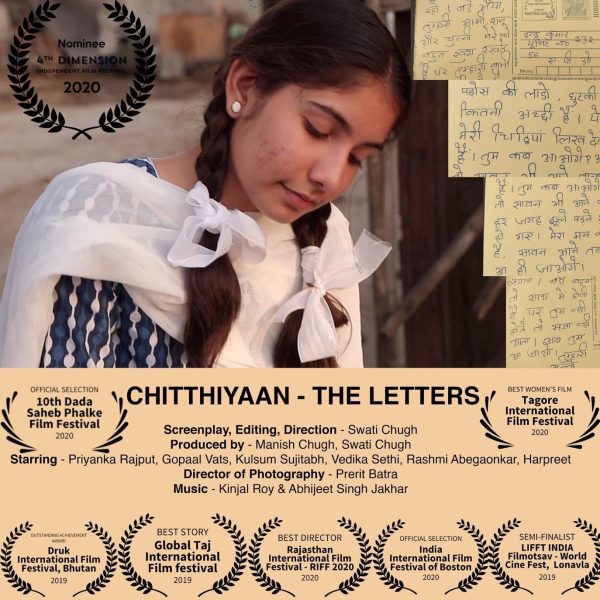
JG: That explains part of the magic of your films Swati. They feel so ‘real’ and ‘true.’
You have filmed 4 silent short films. I find silence very powerful, was it a conscious decision to film without dialogue?
SC: I totally agree with you that silence is very powerful and I didn’t realise that until I had made a silent movie. Though I would love to say I had the foresight and wanted to make a silent film, this was also out of a compulsion.
As I was pursuing the course at New York Film Academy, we were asked to make a silent film as part of the course to strengthen our visual narrative skills. While making the film, I realised it was both challenging and exciting. I realised how powerful it is to convey your story without a single word. The end result was what kept me hooked and I made more silent films after that. I think silent films really worked for me across the language and cultural barriers. New Heaven is one of my silent films which has had a great festival run in 15 countries.
JG: I couldn’t agree more. In a time in the world where we need to pull together, I love the simplicity and global reach of silent moving pictures.
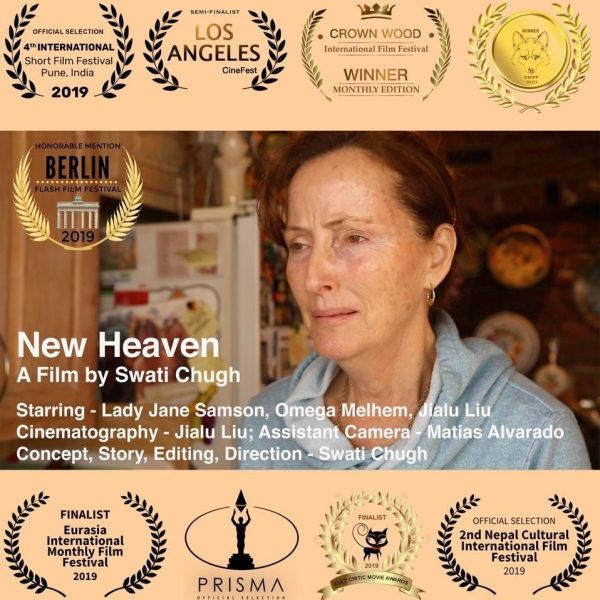
JG: Your short films have won 84 accolades and 26 Awards at film festivals in 20 countries worldwide. I am amazed at the sheer number of awards and accolades you have received for your short films Swati. I’ve never known anyone to receive such a large number. It is clearly testament to what an amazing filmmaker you are. Can you talk us through some of the highlights.
SC: That’s very kind of you to say! It has been an amazing journey for the past 2 years when my films started screening at film festivals. I travelled to several film festivals in India during 2019 including Rajasthan International Film Festival, Global Taj International Film Festival, and the Global Indian Film Festival. I was fortunate to win awards at these. It was an amazing experience and I have met some really wonderful people at all these festivals.
Sadly, when my films started getting selected internationally, I couldn’t travel due to the pandemic. However, the good part was these festivals happened virtually and I was able to connect with filmmakers and audiences worldwide and it was a wonderful experience. Some of the really wonderful ones are Indian Film Festival of Cincinnati, Nassau Film Festival, New York, Berlin Flash Film Festival and Diorama Film Festival. My films have screened at film festivals in 20 countries – India, USA, UK, Canada, France, Russia, Italy, Bhutan, Venezuela, Germany, China, Romania, Nepal, Austria, Turkey, Singapore, Indonesia, Egypt, Greece and UAE. It was through these online sessions that I also got to know about Raindance and then Collab Writers. I have been very fortunate to get to know you, Elliot and so many more wonderful people through Collab Writers.
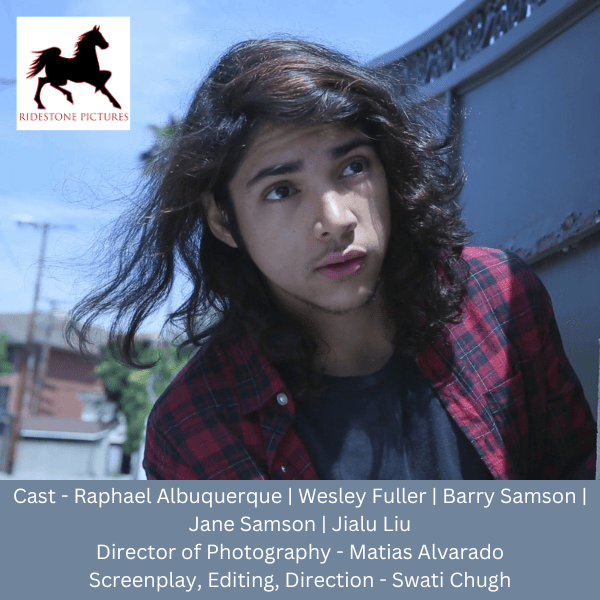
JG: Well, we are delighted to have discovered you Swati, and love the synchronicity of this.
Are you able to share any tips for filmmakers to follow to try to get their films into festivals. Would you recommend that they look for film festivals that air similar films and send work into them?
SC: From whatever experience I have gained so far from festivals, I would suggest anyone looking to get their films into festivals to find out those festivals that would suit your film as per genre, duration, type. I would suggest to get your films on a platform like filmfreeway, festhome, WFCN etc and then start researching about the festivals. Look at the festival’s website, social media pages, past editions, promotion strategies etc.
I’d advise taking a balanced approach while submitting into festivals like entering into all kinds of festivals tier 1, 2, 3 and seeing where you get the maximum response for your films and then repeating that strategy. Each film is different and requires a different strategy. It might seem overwhelming at first but once you start submitting your films, you will get a hang of things and can start refining your strategy. It’s just a one-time upload on the platform and then you can keep submitting to various festivals and it’s absolutely doable yourself. Also, look out for deals and discounts as it will help you to submit films to more festivals and increase your chances of selection.
JG: Sage advice Swati. So, if you are reading this and don’t know where to start with submitting your films, as Swati says you absolutely can DIY to get your films into film festivals.
You also teach filmmaking and you recently taught a course for Volunteer for India. I attended your course and learnt so much. How did that come about? Do you feel that it’s important to give back and be of service in the world?
SC: I am so glad that you attended that workshop and found it useful. It was a great experience for me too and happened by chance. A college student working with an NGO saw my profile and asked whether I could do a filmmaking workshop, the proceeds of which would go towards Covid relief in India. I have always tried to do my bit to give back to society and this was another opportunity to do that. So I did the workshop and it was very well received. I do have experience of being a facilitator in my job, so this was something that came naturally and I am grateful that it was for a great cause and the budding filmmakers found it quite useful.
JG: You are certainly a great teacher and you are a true inspiration to independent filmmakers worldwide. Do you have any advice for wannabe filmmakers, whether young or coming to it later in life? If you could tell your twenty-year-old self something that you’ve had to learn the hard way, what would that be?
SC: Thanks for such amazing compliments! I would just say to all the wannabe filmmakers that if this is I something you really want to do, then just pick up your phone and start shooting some footage, edit it together and there you have your first film. It’s the first step that is the hardest, so don’t hesitate and just take it. If you are not sure whether this is your passion, I would still suggest you to pick up the phone and make a film. Only by making films will you get to know whether you want to do this or not. If I had to tell my younger self one thing, I wish I had recognised my passion early on when I directed a play in 7th grade, I would have got into filmmaking much earlier then. Having said that, it’s never too late to follow your passion if you feel strongly about it. Filmmaking is one such field, where all your life experiences just enrich you as a person and that reflects in the films that you make. So just follow your heart and go for it !
JG: That’s beautiful Swati. I couldn’t agree more. Rather than getting perfect at something before starting, we just need to start. The learning is often in the doing.
I’m sure readers are dying to see your films to learn from you. How can readers see your short films Swati (and when)?
SC: Well, all my films are in film festivals currently but I do keep posting about screening details on my social media pages, so you can watch that space for info. Also, the festival run should end soon for a couple of them and I plan to get them on OTT platforms. For that info as well, you can follow my social media handles below:
Instagram – https://www.instagram.com/director_swati
Twitter – https://twitter.com/director_swati
Facebook – https://www.facebook.com/DirectorSwati/
Collaboration
JG: I know that collaboration is important to you. One such collaboration during the pandemic was with Lucy Beresford, a fellow Founder Member of Collab Writers. Can you tell us about that collaboration and how that worked?
SC: It was a unique collaboration with Lucy and we dared to do something I had never done before. We decided to make a short film for a Raindance competition and we came up with an idea where I would write the screenplay, direct the film from India but the shooting would happen in London since Lucy was both acting and producing the film and she is based in London. It was quite a unique experiment and I am glad that it paid off when we started getting accolades for the film.
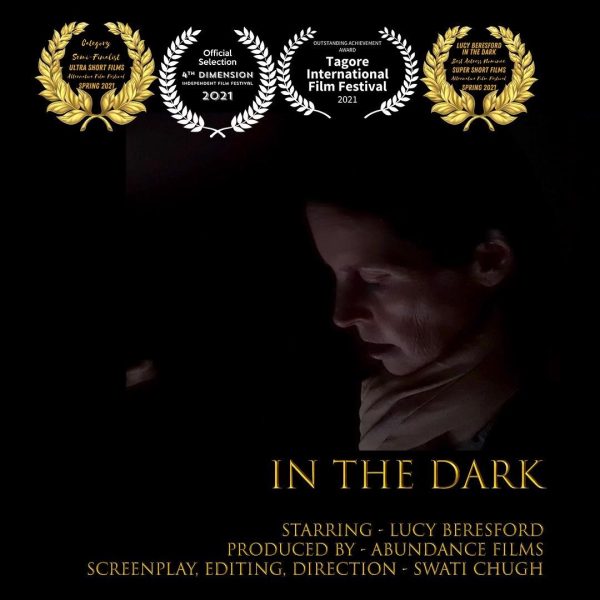
JG: That was so resourceful of you both and such girl power across the world virtually!
What in your view makes for a good collaboration – are there any do’s and don’ts for aspiring collaborators?
SC: I think the most important thing about collaboration is to listen and understand different perspectives. Often times there are differences of opinion and at those times, it’s important to find a middle ground. At the end of the day, the success of the project is what matters the most and everyone involved should have that aim in mind when collaborating.
JG: Listening is so important, you’re so right.
Can you tell us about any current projects that you’ve got in the pipeline that we could look out for?
SC: There is one short film of mine that I have just completed the post production work for and I am starting to submit it to festivals now. Apart from that, there is another short film and a feature script that I am working on. So both these projects are in pipeline and hopefully I get to shoot them soon.
JG: How exciting, can’t wait!
If there is anyone out there looking to work with you, or help make your dreams to become a reality by Exec producing your films, is there anything you are looking for and how can they contact you?
SC: It’s always wonderful to have people support you and I do keep looking for collaborators. I do plan to create a website soon and share details of my pipeline projects. Till then, I am very active on social media and anyone wanting to collaborate can reach out to me through Instagram, twitter or mail. I keep looking out for great talent and support on the projects, I plan to create in the future.
JG: Well you heard it here first, watch the Swati space! Thank you so much Swati, it has been an absolute delight talking to you. You are destined for the stars of the filmmaking world!
